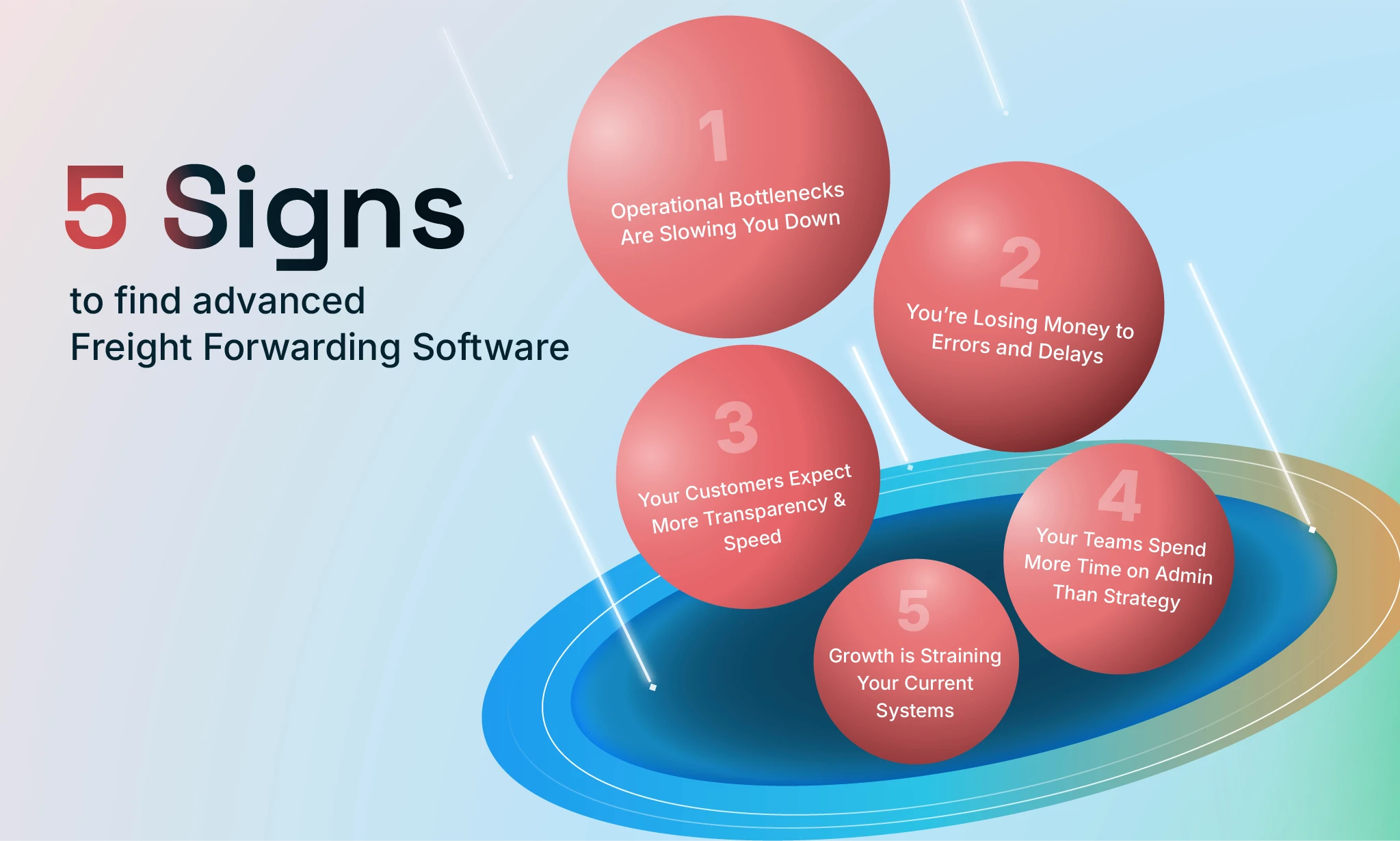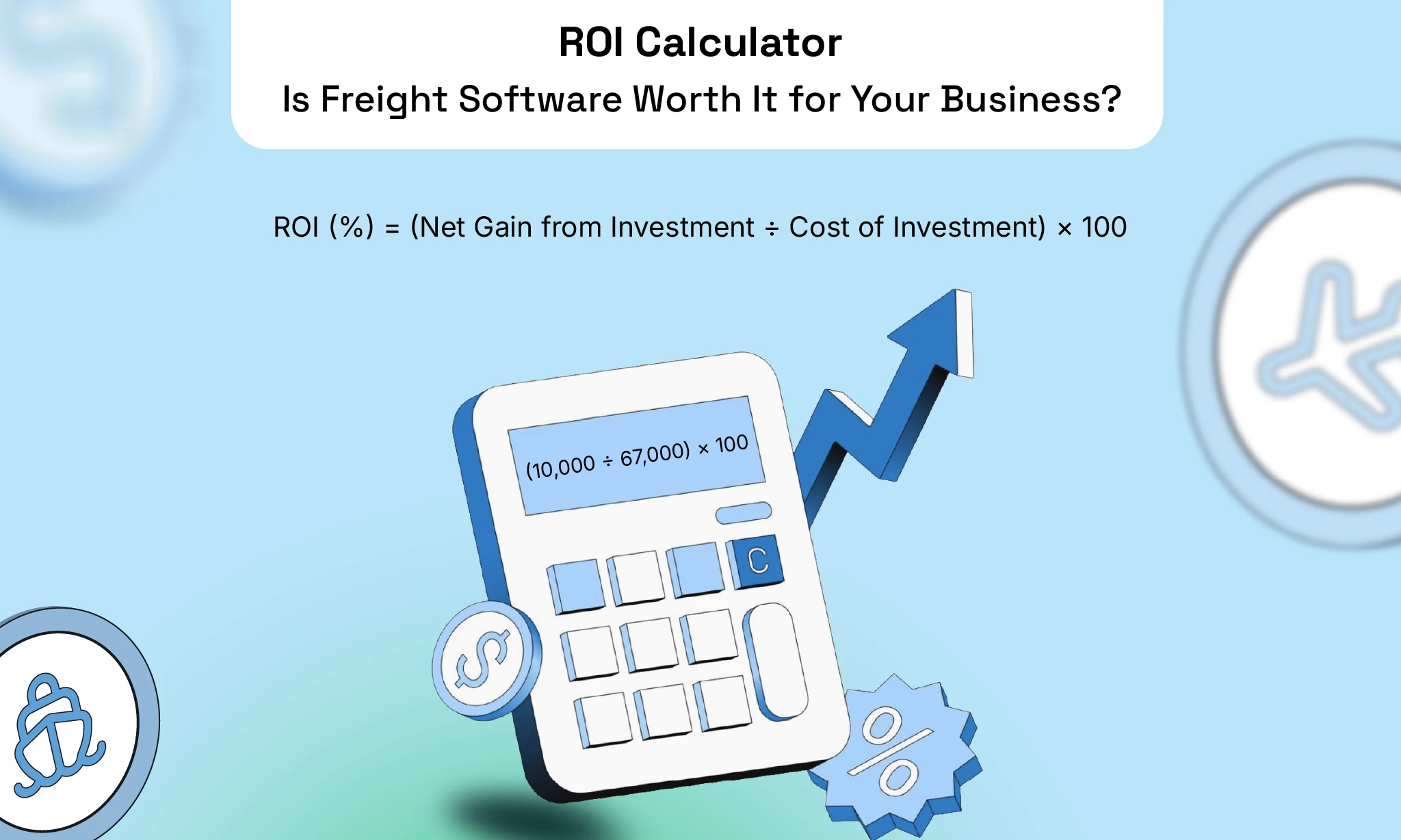Carrier Management: Definition, Importance & How It Works
Author:
Divya Murugan
Published On:
Apr 28, 2025
1 min read
Every decision — no matter how small — sends ripples through your supply chain. Choosing the right transportation partner isn’t just a task to tick off. It’s the difference between on-time deliveries and frustrated customers, between rising costs and real savings.
If you’re constantly dealing with missed shipments, unexpected fees, or unhappy customers, it might be time to rethink how you manage your freight partnerships.
Here’s the deal: Managing carrier relationships might not sound thrilling, but it can make a real difference when it comes to keeping operations efficient and costs in check. Choosing the right carriers and putting smart strategies in place helps everything run smoother—from faster deliveries to happier customers. With the right freight management software, it becomes easier to streamline these decisions and bring more visibility and control into your logistics process.
What Is Carrier Management?
At its core, managing freight partners means selecting, negotiating with, and regularly evaluating the carriers that transport your freight. It’s not just about cost — it’s about understanding the capabilities of each carrier, including their performance metrics and specialization, to ensure they align with your business goals.
Think of it as building a delivery network that has your back. You’re looking for partners that offer fair pricing, handle goods with care, and deliver consistently.
This is especially important in today’s digital freight forwarding world, where delays, market fluctuations, and rising costs have become the new normal.
Now that we know what it is, let’s explore why carrier management deserves your attention.
Benefits of Carrier Management

Investing in good carrier management isn’t just about logistics—it’s about real business value. Here’s what you get when you do it right:
Cost Savings
By comparing rates, negotiating smart contracts, and monitoring hidden fees, companies can reduce freight costs without compromising on quality.
Effective inventory control management is also critical for reducing costs and enhancing order fulfillment.
Improved Delivery Performance
Strong carrier partnerships and performance tracking mean shipments arrive on time, reducing delays and increasing reliability across your supply chain.
Effective order fulfillment within logistics management is essential for optimizing operations, enhancing customer satisfaction, and reducing costs.
Better Risk Management
Having multiple vetted carriers and clear service terms can have a significant impact on operational efficiency and costs by reducing your exposure to disruptions, capacity shortages, and compliance issues.
Increased Operational Efficiency
Automation, real-time visibility, and streamlined communication tools reduce manual tasks, allowing your team to focus on what matters most.
Reasonable inventory control is an essential factor in fulfilling customer orders effectively, and when selecting a carrier, balancing cost with service quality and reliability is crucial to prevent negative impacts on logistics operations.
Better Customer Experience
Timely deliveries and transparent communication mean higher satisfaction, repeat business, and a stronger brand reputation.
Our transportation operations team manages and updates surcharges on behalf of customers, alleviating the responsibility of tracking surcharge changes from the clients.
Scalability and Flexibility
As your business grows, well-managed carrier relationships mean you can scale easily and pivot when market conditions change, without missing a beat. Efficient logistics services ensure the safe transportation of goods to different locations, maintaining quality and service levels.
Let’s now look at what makes carrier management truly effective.
Key Elements of Carrier Management

Carrier management is more than just finding a partner to move your goods. It’s about building long-term relationships, being compliant, and continuously optimising your logistics. Here are the five key components of good carrier management:
Carrier Choice
Choosing the right carriers is the foundation of smooth operations. This goes beyond just comparing costs; it’s about finding partners that match your logistics needs and business goals. When choosing a carrier, consider:
Cost: Finding the balance between price and service.
Reliability: Look for a proven track record of on-time delivery.
Capacity: Ensure the carrier can handle your volume.
Geography: Do they cover the areas you need, especially if you’re shipping internationally?
A good carrier will become part of your logistics process and drive efficiency across the board.
Contract Negotiation
Good contract negotiation is key to building win-win relationships with carriers. You want clear agreements that benefit both parties. Here’s what to focus on during negotiations:
Rates and Pricing: Cost structures (e.g., per mile, per load).
Delivery Timeframes: Timely deliveries aligned with your business needs.
Damage Protocols: How to handle damaged goods, penalties for non-compliance, etc.
Additional Services: Adding value through services like real-time shipment tracking.
Having clear terms for everything from penalties for late delivery to extra services can set the stage for smoother and more efficient partnerships. Additionally, considering other factors such as unique needs, local climate, service quality, specialization, and future adaptability can significantly impact the effectiveness and satisfaction of the chosen solutions.
Performance Tracking
Carrier capabilities should never be a set-it-and-forget-it task. Regular tracking helps you see how carriers are meeting your expectations and where you need to make adjustments. Focus on key performance indicators (KPIs) like:
On-time delivery: Are they meeting deadlines?
Damage incidents: How often are products being damaged in transit?
Billing accuracy: Are invoices matching the agreed terms?
Schedule adherence: Are deliveries happening as promised?
This ongoing evaluation helps you make informed decisions, whether it’s for continuous improvement or renegotiating terms and conditions. Building relationships with carriers can go a long way in optimising your logistics. Proactive relationship management helps to smooth out any issues that arise. Here’s how:
Open Communication: Keep the lines of communication open and address problems or challenges early.
Timely Payment: Pay carriers on time to maintain a good relationship.
Recognition: Celebrate a job well done—appreciation can strengthen partnerships and get preferential treatment.
By nurturing these relationships, you can get better rates, priority services, and support when you need it most.
Compliance
Carrier compliance isn’t just a legal requirement—it’s critical to smooth operations. Carriers must adhere to industry regulations, safety standards, and legal requirements, or they risk delays, fines, and reputational damage. Compliance areas to watch out for:
Cargo Handling: Proper handling and storage of goods.
Safety Standards: Transport safety regulations.
Labor Laws: Employment regulations, especially for drivers.
Environmental Regulations: Sustainability and environmental laws.
Customs Procedures: For international shipments, customs regulations.
Keeping an eye on compliance is key to avoiding surprises and penalties. In the realm of e-commerce, the impact on logistics is significant as businesses must adapt their strategies to meet evolving consumer demands and maintain competitiveness.
With the key elements in place, let’s move on to proven best practices.
Best Practices for Effective Carrier Management

Carrier management is not a one-off but an ongoing process that involves several best practices:
Different industries, from e-commerce to manufacturing, rely on effective logistics management to achieve operational efficiency and maintain a competitive edge.
Research and analysis of multiple carriers
Helps companies understand the strengths and weaknesses of each carrier, enabling them to choose the right partners for their logistics needs.
Service levels and rates are clearly defined
Defining expectations and terms helps avoid misunderstandings and ensures you get the best service.
Key performance metrics monitored
Track on-time delivery rates, damage incidents, and responsiveness to hold carriers accountable and make data-driven decisions.
Capacity, equipment, and risk management evaluated
These factors play a significant role in choosing the right carriers and maintaining service.
By following these best practices, companies can reduce costs, improve service quality, and customer satisfaction, ultimately getting a competitive edge.
Even with all these practices, real-world challenges still pop up.
Real World Challenges

Even the best-run logistics teams face challenges along the way. Here’s how to overcome them:
Good logistics services are crucial for moving goods between locations, ensuring that products and materials are correctly handled, maintaining product quality, and facilitating efficient operations.
Capacity Issues
Holiday surges and supply chain disruptions – demand can quickly outstrip supply. Don’t put all your eggs in one basket. Use your RMS to diversify carriers so they can deliver to multiple locations and create backup plans. Ensure that each shipment process includes the destination in the API request to successfully complete the shipping request.
Fragile Relationships, better service?
Build trust. Share feedback, recognise good work, and approach negotiations as a partnership, not a battle.
Different carrier models can significantly impact service quality and efficiency. By understanding and choosing the right model, your company can align with its service goals and operational needs.
Disconnected Systems
When systems don’t talk to each other, data gets lost. Invest in integrated solutions that combine freight, finance, customs, and more into one clean interface to help you establish best practices for logistics management.
Additionally, integrated systems can help you track and analyze retail sales trends, providing valuable insights into the performance of different sectors within logistics and supply chain management.
Hidden Fees
Warehousing charges. Fuel surcharges. Customs handling.
They add up. Read the fine print, ask the hard questions, and use real-time tools to catch red flags before they become surprises.
Evaluating multiple factors is key to finding the right carrier for your needs, as factors such as distance, shipment size, and delivery speed can significantly impact costs. Additionally, consider choosing the right air conditioning units for optimal indoor comfort, as these systems effectively manage indoor air quality and temperature levels.
Looking ahead, how will technology shape carrier management?
Future of Carrier Management

The future of carrier management will be transformed by technology – automation, artificial intelligence, and real-time data analytics. These will enable companies to optimise their logistics, reduce costs, and improve customer satisfaction.
Using multiple carriers and modes of transportation will become more common as businesses seek to diversify their logistics networks and improve supply chain resilience. By using real-time data, companies can make better decisions, anticipate disruptions, and respond to changing market conditions.
Automation and AI will also streamline processes, reduce labour costs, and increase efficiency. As these technologies evolve, businesses that adopt them will be better positioned to stay ahead of the curve and have efficient, effective, and customer-focused carrier management.
Let’s see how a platform like CargoEZ fits into this future.
How Can CargoEZ Help in Carrier Management?
Effective management of freight partnerships requires the right tools, data, and processes to ensure smooth, cost-effective, and timely delivery of goods. Our platform is designed to simplify these complexities, giving you the tools you need to optimise your transportation network. Here’s how it can help with carrier management:
Carrier Selection
Choosing the right partner is key, and the platform makes this easy. With carrier selection tools, you can evaluate potential partners based on key metrics such as pricing, performance history, and capacity. You can compare multiple carriers and choose the best fit for your logistics need,s and get better outcomes for your supply chain.
Performance Tracking
Tracking carrier performance is critical for continuous improvement. With real-time monitoring features, you can track key performance indicators such as on-time delivery rates, damage incidents, and customer satisfaction. Having this data at your fingertips helps you identify top performers and pinpoint areas for improvement or adjustment.
Communication and Collaboration
Good communication is key to successful partnerships. The platform facilitates seamless communication between you and your carriers, reducing the chance of misunderstandings. Through real-time updates or built-in messaging tools, you stay informed and can resolve issues quickly. This open communication builds trust with your carriers, making them more reliable over time.
Contract and Rate Management
Managing contracts and negotiating rates can be a complex process. The platform simplifies this by allowing you to easily manage contracts and service level agreements (SLAs). It keeps you organised so pricing, penalties, and service commitments are clear and consistent. The rate management system also helps you track fluctuations and where you can save.
Compliance and Risk Management
Keeping up with regulatory requirements can be a challenge. The platform helps manage compliance by keeping you up to date with industry standards, safety regulations, and legal requirements. Whether it’s customs compliance or environmental laws, it minimises risk and ensures your shipments meet all necessary standards.
Data Driven Decision Making
Access to accurate real-time data is critical for informed decision-making. With advanced analytics and performance reports, you can make better decisions on which carriers to work with, optimise your shipping routes, and identify areas for improvement. The platform’s data-driven insights enable you to make strategic decisions that drive your business forward.
By integrating this platform into your logistics operations, you can simplify carrier management, reduce risk, and build stronger relationships with your shipping partners. It’s an all-in-one solution that gives you control of your freight partnerships and greater efficiency in your supply chain.
Here’s how CargoEZ brings clarity and control to every part of carrier management.
Frequently Asked Questions (FAQs)
1. What is carrier management in freight forwarding?
Carrier management refers to the process of selecting, onboarding, monitoring, and maintaining relationships with shipping carriers to ensure reliable and cost-effective transportation of goods.
2. Why is carrier management important for freight forwarders?
Effective carrier management helps reduce shipping costs, improve delivery reliability, maintain service consistency, and streamline operations — all of which enhance customer satisfaction.
3. How does carrier onboarding work?
Carrier onboarding typically includes verifying carrier credentials, setting up service contracts, defining agreed rates and terms, and integrating carriers into the freight platform or TMS.
4. What factors should be considered when choosing a carrier?
Consider service reliability, pricing, coverage area, transit times, technology integration capabilities, compliance history, and customer service responsiveness.
5. How do freight forwarders manage multiple carriers efficiently?
Freight forwarders use freight management systems (FMS) or freight platforms to track performance, automate routing, manage contracts, and maintain communication with multiple carriers in one place.
6. Can carrier management impact customer satisfaction?
Yes. Reliable carriers ensure timely and safe delivery, fewer disruptions, and better service quality — all of which directly affect the customer experience.
7. What are the common challenges in carrier management?
Some common challenges include rate fluctuations, limited carrier availability during peak seasons, inconsistent service levels, lack of real-time visibility, and managing compliance requirements.
8. How does technology help in carrier management?
Technology streamlines carrier selection, performance tracking, contract management, and communication. It also helps in data-driven decision-making and improving operational efficiency.
9. How can I improve my carrier relationships?
Maintain clear communication, provide regular feedback, address performance issues constructively, and treat carriers as long-term partners rather than just vendors.
Don't forget to share this blog!



